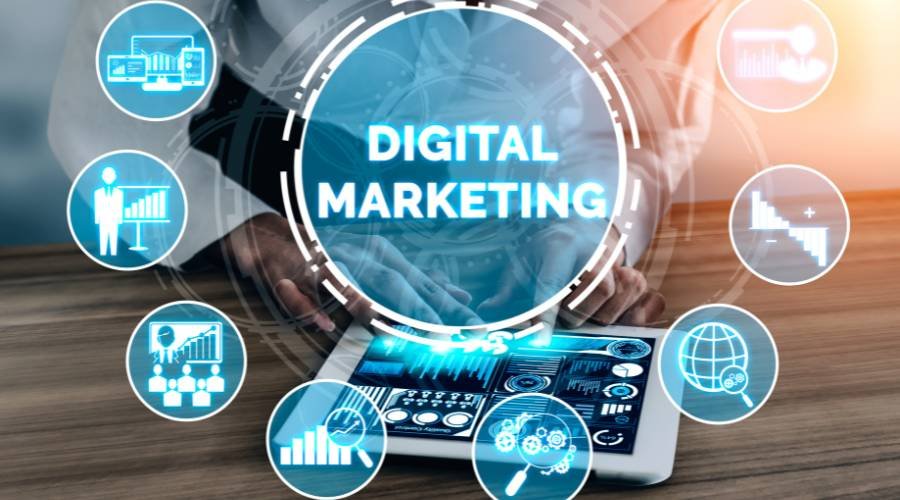Law firms are always looking for new ways to attract and keep clients. With the legal industry expected to hit $348.32 billion in revenue by 2024, the question is: What marketing trends can help law firms grow? We’ll look at how digital changes are reshaping legal marketing and what strategies successful firms use to stay ahead.
Key Takeaways
- The legal industry is embracing digital marketing strategies to stay competitive, with a focus on website optimization, co-branded marketing, and audience-specific targeting.
- Leveraging marketing automation tools can streamline efforts and provide valuable insights to measure campaign performance.
- Building a strong online reputation through client reviews is crucial for establishing trust and credibility in the legal sector.
- Incorporating social media and professional networking platforms into the marketing mix is essential for reaching and engaging potential clients.
- Developing strategic partnerships and referral programs can lead to more cost-effective client acquisition strategies.

The Evolution of Digital Marketing in Legal Services
In the last ten years, the legal field has changed a lot. It moved from old ways to new digital strategies. Now, digital methods like LinkedIn, email, and Facebook are key, not just print and mail.
Legal Marketing Trends: Traditional vs. Digital Approaches
Before, law firms used billboards and print ads to get noticed. But the Internet changed everything. Now, they use SEO, content marketing, and PPC to reach people online.
Current Industry Revenue Projections
The legal industry is growing fast. It’s expected to make $348.32 billion by 2024. This means law firms must compete harder, using digital marketing to stand out.
Market Competition Analysis
Law firms need to keep up with digital marketing trends to succeed. Working with experts can help them save money and get more clients in a tough market.
| Marketing Approach | Utilization Rate |
|---|---|
| Event Sponsorships | 44% |
| Print Advertising | 24% |
| Direct Mail | 11% |
| 51% | |
| Email Marketing | 40% |
| 27% |
Website Optimization for Lead Generation
Law firms face a big challenge in the digital world. They need to optimize their websites to get more leads. With 51% of law firms struggling with website optimization, it’s clear that a strong online presence is key.
A well-designed, mobile-responsive website is at the heart of lead generation. By making sure our site works well on both desktops and mobiles, we meet our clients’ needs. This makes for a better user experience, leading to more engagement and conversions.
Other important tactics include a solid content strategy and using social media. By creating valuable content, we show our expertise and attract clients. This helps us move them through the sales funnel.
Also, using social media on our website helps us reach more people. It helps us connect with our audience better. With mobile-friendly sites, good content, and social media, we build a strong online presence. This is the foundation of our lead generation efforts.
“In a lead generation process, the main stages in a sales funnel are Awareness, Interest, Decision, and Action.”
By optimizing our website for each stage of the sales funnel, we help clients on their journey. From catchy headlines to clear calls to action, every part of our site is important. It all helps drive legal lead generation and our firm’s success.
Building a Strong Law Firm Brand Identity
In today’s competitive legal world, having a strong brand is key. It helps law firms stand out and attract clients. A good brand shows our legal skills and builds trust and loyalty with our audience.
Experience and Expertise Demonstration
We show our skills and experience through our content. Research from Headstream shows that brands that connect with people are more likely to win them over. They found that people are more likely to share and buy from brands they trust.
Trust Building Through Client Reviews
Trust is vital in the legal field. Client reviews help build that trust. Morgan & Morgan, a top personal injury firm, uses social media to reach more people. By listening to and sharing client feedback, we show our dedication to great service.
Professional Image Development
A professional image is crucial for law firms. Consistency and clarity are key to a strong brand. We focus on a great website, a memorable logo, and a clear message. This helps us connect with our audience better.
Creating a strong law firm brand takes strategy. By showing our expertise, building trust, and looking professional, we stand out. This attracts the right clients to our practice.
Legal Marketing Trends and Digital Transformation
The legal world is changing fast. Law firms are now using online platforms to connect with clients. LinkedIn, email and Facebook are the top choices. They focus on building a strong online presence, starting with a good website.
Digital marketing is key for law firms to reach out to clients in new ways. A study shows a 26% increase in spending on online marketing for law firms. This shows how important digital strategies are becoming.
To stay competitive, law firms need to keep up with digital trends. They use technology to improve client engagement and get more leads. This includes optimizing websites and using AI for marketing.
Client Reviews and Reputation Management
In today’s world, client reviews are very important for law firms. 22% of consumers read at least 10 reviews before choosing a law firm. Law firms must watch and respond to reviews to improve and gain trust.
Leveraging Video Content
Video is a strong tool for law firms to show their skills and connect with clients. There’s been a 41% increase in video content clicks and a 32% increase in video content impressions since 2021. Video is becoming more important in legal marketing.
Embracing AI and Automation
The legal field is leading in AI use. Firms use AI to make things easier, improve client service, and stay ahead. 50% of people think AI makes finding law firms better. AI is making a big difference in legal marketing.
As the legal industry keeps changing, firms that adapt to digital trends will do well. They will thrive in the future.
Leveraging AI and Automation in Legal Marketing
The legal industry is changing fast with AI and automation. Law firms are now using new tech to improve their marketing. This helps them stay ahead in a fast-changing digital world.
Document Management Solutions
AI is making a big difference in legal document management. Tools like NetDocuments use AI to organize and find legal documents quickly. This saves time and lets lawyers focus on more important work.
Research Automation Tools
AI is also changing legal research. Tools like CaseText use AI to help lawyers find the right cases and laws quickly. This makes research easier and helps lawyers make better decisions.
AI Implementation Challenges
Using AI in legal marketing has its challenges. Issues like biased data and needing skilled people to use AI must be solved. But, the legal world is working hard to overcome these problems and use AI to succeed.
| AI Tool | Application | Key Benefits |
|---|---|---|
| NetDocuments | Document Management | Automated organization, storage, and retrieval of legal documents |
| CaseText | Legal Research | Streamlined legal research through natural language processing and machine learning |
| AI Chatbots | Client Interaction | Personalized customer support, lead generation, and improved client engagement |
As AI and automation grow in the legal world, firms that use these technologies will do well. AI helps law firms work better, reach more people, and grow. This means they can succeed in today’s digital world.

Multi-Channel Marketing Strategies
Law firms are now using a wide range of marketing strategies to get noticed. They use an approach called omnichannel marketing. This method uses many touchpoints to give clients a smooth and personal experience.
With omnichannel marketing, law firms can use different channels like webinars, emails, and social media. This way, clients see the same message everywhere. It builds trust and helps create strong relationships.
Understanding the client’s journey is key to good omnichannel marketing. Law firms need to mix their online and offline marketing. This creates a unified experience that speaks to their audience.
Law firms are also using data to make their marketing more personal. They look at how clients behave across different channels. This helps them tailor their messages to meet each client’s needs.
Using omnichannel marketing has helped law firms. Those who do it well see a 9.5% increase in revenue each year. This shows how effective a well-planned marketing strategy can be.
| Marketing Channel | Average ROI |
|---|---|
| Email Marketing | $42 for every $1 invested |
| Technical SEO | 117% |
| Paid Social Media (Facebook) | Highest among social media channels |
| Content Marketing | 62% less costly than traditional methods, 3x more leads |
| Video Marketing | Up to 86% increase in conversion rates |
| Influencer Marketing | Comparable or higher ROI than other platforms |
As the legal world keeps changing, law firms that use a wide omnichannel marketing approach will do well. They will attract more clients and grow in a competitive market.
Content Marketing and SEO Best Practices
In the legal world, content marketing and SEO are key for attracting clients. Good SEO for law firms means doing deep keyword research. It also means making content that matches what people are searching for. Plus, focusing on local SEO helps you reach people in your area.
Keyword Research and Implementation
Starting a strong content marketing plan begins with keyword research. Knowing what your audience searches for helps you make content that meets their needs. Use these keywords well in your website and blog posts to boost your SEO.
Content Authenticity Guidelines
With AI making more content, law firms must focus on real, honest content.
A recent study found that 77% of users reported being misled by AI-generated content.
To gain trust, make sure your content comes from real legal experts. It should show your firm’s special knowledge and view.
Local SEO Optimization
- Make your website and online profiles easy to find for local searches, including your city, state, and what you do.
- Ask clients to leave reviews on Google, Bing, and other places to make your firm look good locally.
- Join local events, sponsorships, and partnerships to show you’re a big part of the community.
By following these content marketing and SEO tips, law firms can draw in and keep clients. They can also show they’re experts and stand out in a crowded field.
Social Media and Professional Networking
Social media is key in today’s legal marketing world. Sites like LinkedIn, Twitter, and Facebook help law firms connect with people, share important content, and show their brand. This way, legal pros can strengthen ties with clients and be seen as industry leaders.
LinkedIn stands out as a top networking spot for lawyers. It lets them highlight their skills, share success stories, and meet other legal minds. Lawyers can also join in on discussions, find groups, and show they know their stuff.
- LinkedIn is great for law firms to post big content like case studies, legal articles, and big news.
- Twitter is perfect for quick legal tips, insights into debates, and links to longer articles.
- Instagram is for showing the human side of the law through photos of the office, culture, and community work.
- YouTube is where law firms can share educational videos like webinars and explainers on legal topics.
- TikTok is for reaching a younger crowd with short, fun videos that make the law easy to understand.
But, law firms must keep their online image professional and follow the rules. Lawyers need to protect client secrets, keep personal and work lives separate, and make sure their online look matches the firm’s brand.
By using social media for lawyers and legal professional networking, law firms can manage their online reputation management. They can connect with their audience and be seen as reliable legal experts in their field.
Client Acquisition Through Strategic Partnerships
In the competitive legal world, partnerships and referral programs are key. They help law firms get new clients. B2B referral systems are used by 50% of businesses and work well, with over 40% success rate.
By working together, we can reach new people and spend less on getting clients.
Referral Program Development
Creating a strong referral program can change the game for law firms. Pace Law, for example, has a referral program that rewards both current clients and industry peers. This approach encourages more leads and helps turn them into loyal clients.
Cross-Promotion Opportunities
Working with other businesses can open up new ways to promote each other. For example, personal injury lawyers and medical professionals can team up. Together, they offer a full range of services to their clients.
This way, we can make a bigger impact and reach more people.
Industry Collaboration Benefits
Partnering with other legal firms can bring big benefits. By working together, we can share knowledge, resources, and networks. This attracts more clients and builds a sense of community in the legal world.
FAQ
What are the key trends in legal marketing?
The legal world is moving to digital marketing. This includes making websites better for leads, teaming up with other businesses, and focusing on specific audiences. They also use marketing tools to automate tasks and get reviews from clients to show they are trustworthy.
How are law firms shifting their marketing strategies?
Law firms are changing how they market. They still use old methods like sponsoring events and sending mail. But now, they also use digital tools like LinkedIn, email, and Facebook. This change is making the market more competitive.
Why is website optimization crucial for law firms?
Making websites better is key for law firms to get more leads. They face a big challenge in this area. To improve, they need to make sure websites work well on phones, look good, and have useful content. They also need to use social media and SEO well.
How can law firms build a strong brand identity?
Building a strong brand is vital for law firms to stand out. They need to match their brand with their team’s values and culture. Showing off their expertise through content and using client reviews helps build trust.
What are the latest trends in digital transformation for the legal industry?
The legal world is quickly changing digitally. Law firms are using online platforms more, especially LinkedIn, email, and Facebook. They focus on having a strong online presence, starting with a good website.
How are law firms leveraging AI and automation?
Some law firms use AI tools like ChatGPT, but 62% don’t. Those who do save a lot of time. AI helps with document review and writing. But, there are challenges like AI bias in 38.6% of facts.
What multi-channel marketing strategies are law firms adopting?
Law firms use many marketing channels to reach more people and engage clients. They use webinars, email, chatbots, videos, and content marketing. They also use social media.
What are the best practices for content marketing and SEO in the legal industry?
Good SEO means doing keyword research and making content that matches what people search for. Being authentic in content is key, as 77% of users can be misled by AI.
How are law firms using social media and professional networking?
Social media, especially LinkedIn, is important for law firms. It helps them share content, engage with people, and show their brand. It also helps drive website traffic and build client relationships.
How can law firms acquire clients through strategic partnerships?
Law firms can get clients through partnerships and referrals. B2B referral systems work well, with over 40% success. Working with other professionals, like doctors, can help both sides.




